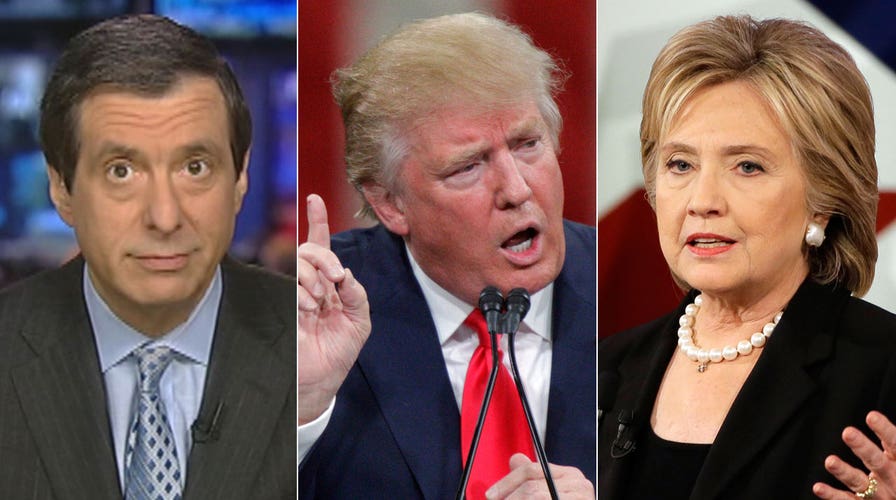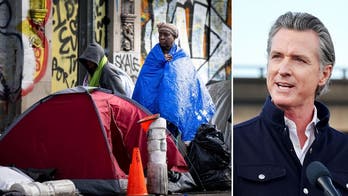Kurtz: Pressing the candidates on terror
'Media Buzz' host on the role terrorism will play in 2016 election
There comes a point in every presidential campaign where the media stop fooling around and impose the commander-in-chief test.
In the wake of the Paris attacks, we have reached that moment.
Suddenly, everything that Hillary Clinton, Donald Trump, Ben Carson, Jeb Bush and the rest say is being viewed through a sharper lens: Can we imagine this person protecting the homeland against terrorist attacks?
And in a year when much of the public has been enamored of outsiders, does political experience and knowledge of foreign affairs suddenly seem a bit more desirable?
It’s a rare election that doesn’t have a wakeup call due to some global trouble spot. The 2000 campaign that followed Bill Clinton’s impeachment was largely a peace-and-prosperity affair. But the shadow of 9/11 hung over the next two elections.
The 2008 contest, which was partly about John McCain’s support for George W. Bush’s surge in Iraq, got a jolt when Russia sent troops into Georgia. The 2012 campaign, which followed the killing of bin Laden, was shaken up by the fatal attack in Benghazi.
Foreign policy has really taken a back seat in this campaign as the media have focused on Hillary’s email, the Trump phenomenon, Carson’s life story, Rubio’s credit cards and the like, along with the usual panoply of polls, predictions and partisan insults. Trump’s Twitter feed probably generated more headlines than Syria.
But that was before the massacre of 129 people in France.
This is a double-edged sword for Clinton. As a former secretary of State, she is obviously seen as steeped in foreign affairs. But that means she has to defend Barack Obama’s record, and her own, on the mounting chaos in the Middle East.
Hillary is a bit more hawkish than the president, and is subtly distancing herself from some of what he is saying. But that may not be enough.
We saw the complications for Clinton when she and other Democrats refused to say during the CBS debate that we are at war with radical Islam. She also had to defend her vote in favor of the Iraq war, erasing her ability to blame the rise of Mideast terror on Bush’s invasion.
Trump has been thundering for months that the U.S. should bomb the S out of ISIS. He also has been leading the Republican charge against illegal immigration, and opposed allowing Syrian refugees into the country before it became fashionable for the GOP. With Obama complaining that some critics want him to be more “bellicose,” no one has ever accused Trump of being soft-spoken.
But Trump, while channeling the mood of Republicans, is a wealthy businessman, developer and reality TV star. Will that be seen as the resume the next commander-in-chief needs?
Carson, the world-class neurosurgeon, faces similar questions in this new environment. Is he the man to lead an assault against global terror? He had a hard time on “Fox News Sunday” detailing a plan to go after ISIS, or even to say which country he would call first in assembling an international coalition.
Former CIA agent Dewey Clarridge, a Carson foreign policy adviser, told the New York Times that the candidate needs weekly conference calls because "nobody has been able to sit down with him and have him get one iota of intelligent information about the Middle East."
The same questions might be asked of Carly Fiorina, who often says she has met Vladimir Putin. But that was in the context of her job as CEO.
Jeb Bush has been aggressively going after Obama in television interviews, declaring that we must “take out ISIS” and saying on “Meet the Press” that he is willing to put boots on the ground.
On “Fox & Friends,” Jeb said: “The president is incrementally getting us into a quagmire.”
But the use of that word invariably triggers memories of his brother’s invasion of Iraq, sparking the obvious followup questions. It may be unfair to judge Jeb’s policies by comparing them to those of Bush 43, but it’s the price of being the third family member to seek the White House.
Every candidate is recalibrating. Rubio, who serves on the Foreign Relations Committee, criticized Ted Cruz and Rand Paul for voting to weaken the NSA’s intelligence-gathering abilities. Cruz says he will push legislation to bar Syrian refugees from coming to our shores.
And this debate will unfold against the backdrop of public opinion, which wants more aggressive action against ISIS but is divided over the wisdom of sending U.S. ground forces.
A new Reuters poll provides a clue. Trump and Clinton were the top choices among all respondents to carry the battle against terror, with 20 percent each.
Among Democrats, 52 percent chose Clinton, Among Republicans, 33 percent picked Trump, followed by Rubio at 17 percent. Carson and Bush were tied at 9.
For the media, this issue is is the equivalent of Hillary’s ad against Obama, asking voters who they want answering a 3 a.m. call in a crisis. After what happened in Paris, that no longer seems a merely theoretical possibility.





